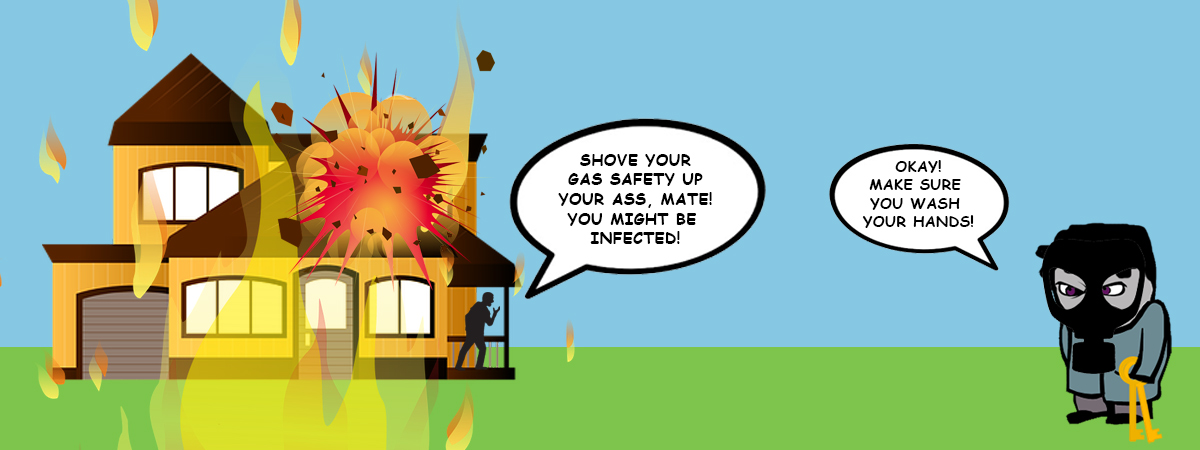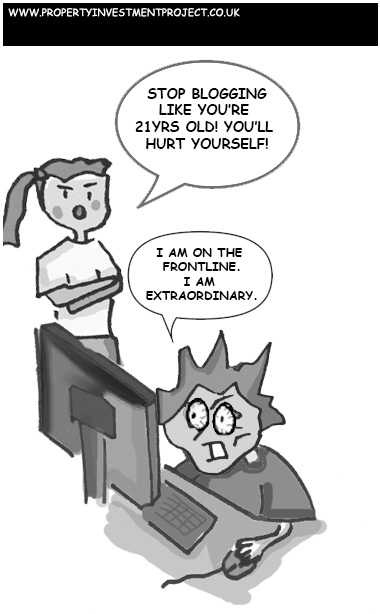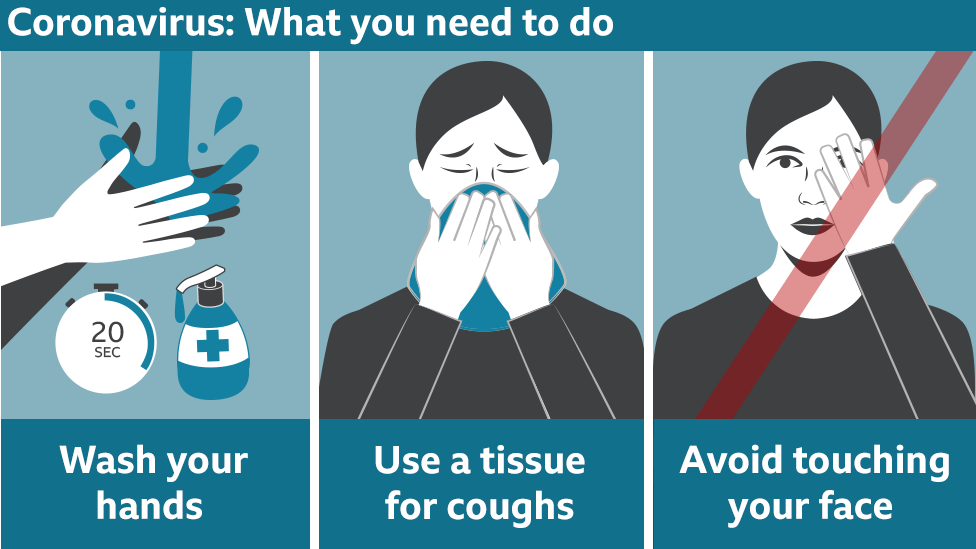
I know the coronafungus has raised more questions than it’s answered, but I hope there’s no doubt in anyone’s melon that landlords still remain “legally obligated to ensure properties meet the required standard – urgent, essential health and safety repairs should be made.”
I’ve been inundated with panic questions over the past two weeks, many of which have been focused on how to comply with our property management obligations (e.g. inspections, gas safety checks, and repairs) while respecting social-distancing and self-isolating tenants.
What’s the protocol for this jacked-up situation?
Before I get into it, I just want to say that since this whole coronavirus thing kicked off, I’ve been averaging one blog post a week. You heard correct, ONE-A-WEEEEEK!
I haven’t been this active since I was fresh-faced and 21. In all honesty, I don’t know how much longer I can maintain this pace before my body reminds me that this is a young-bucks game, and the joints in my nimble fingers have long passed their sell-by date.
However, I do appreciate there’s a killer virus on the loose, so we’re all in survival mode and many of us are stepping up and doing extraordinary things. Like blogging more than normal.

I don’t expect you and aunt Doris to stand on your doorstep, clapping and banging on your pots and pans. But it’s certainly an idea.
Anyways.
For the past week or so I’ve been curating reputable resources that cover the issue of property management during the coronavirus pandemic, so while I’m still chugging along, I should go through some of the FAQs (before my body realises I’m *cough* 24 *cough*, and not 21 anymore)…
Table of contents
- Gas Safety Checks during the coronavirus
- Repairs and maintenance during the coronavirus
- Property inspections during the coronavirus
Gas Safety Checks during the coronavirus
How to manage gas safety inspections has definitely been the most frequently asked question, which isn’t particularly surprising.
All of our legal responsibilities as landlords are important should be complied with, even though some are plain stupid, but gas safety is definitely one of the most honourable.
I’ve been directing people towards a YouTube clip provided by the folk over at PropertyTribes, where landlord and tenant legal solicitor, David Smith, covers the issue of gas safety, which has spared me from considerable finger-tapping up until now.
Enduring the 10 minute footage is a good investment, but I’ll also transcribe the key-points below…
- The gas safety legislation has not changed: the Health & Safety Executive (HSE) are the prosecuting body for gas safety, and they’ve always provided guidance on their website about when they will and won’t prosecute landlords.
Essentially, new temporary legislation hasn’t been introduced because the existing legislation is still relevant.
- What the HSE expects – landlords should make 3 reasonable efforts to obtain access to the property in order to conduct a gas safety check.
- If the tenant refuses access because they are scared of contracting the virus – landlords should explain:
- Why access to the property to conduct a gas safety check is important (i.e. ironically, it’s for the tenant’s own safety. A gas leak could easily wipe them out before the coronavirus gets a hold of their lungs).
- What safety precautions will be put in place to ensure the check will be safely conducted e.g. the engineer will wear a gas mask, social distance will be practised, communication is not necessary, the inspection will be quick etc. Of course, you will you need confirm the safety precautions with the engineer beforehand.
- If the tenant still refuses access after 3 attempts – in this case, the landlord has made all reasonable attempts and complied with what the HSE expects. However, the landlord should keep in regular communication with the tenant and schedule a gas safety check for when it’s possible.
- If the tenant is self-isolating – this is a perfectly reasonable defence and in this case the landlord should not attempt to obtain access during this period. However, landlords should organise the check for when the isolation period has ended.
- If you can’t find contractors – on the flip side, the greater challenge might be finding contractors that are actually willing to enter the premises to conduct the work.
In this case, similar rules apply; as long as the landlord has made reasonable efforts to find 5-6 contractors but to no avail, then the HSE is likely to accept that.
If anyone is struggling to find a local Gas Safe registered engineer to conduct a check:
- Book one online via LettingAproperty.com, £79 inc VAT.
- Try searching for a local supplier on the Gas Safe website.
- Get everything in writing – as always, it’s important to communicate in written form, including any attempts of access, and your tenants response(s), so everything can be verified if necessary. It’s important for landlords to secure evidence that reasonable attempts have been made to meet legal obligations.
Thank you David and Vanessa.
Oh, and nice sleeves, David. Very funky fresh.
Repairs and maintenance during the coronavirus
David did also cover this matter in his interview, and so does the RLA in this article, so I’m just going to combine forces and dish you up a Frankenstein…
- As per the MHCLG press release, “Landlords remain legally obligated to ensure properties meet the required standard – urgent, essential health and safety repairs should be made.”
- Repairs should be judgement on the urgency. Any repair that isn’t critical should be delayed.
- Essential works, such as water supply, sanitation and heating failure will still need to be addressed, so access with the permission of the tenant should be made so work can be dealt with.
- Anyone accessing the property to manage the repair should ensure they are not symptomatic.
If the tenant refuses entry while critical repairs are required, I *guess* the normal rules apply, which means landlords aren’t allowed to let themselves in, and they will need to obtain a court order first (after the courts reopen, that is, in approx 80 days). Okay, cool.
Property inspections during the coronavirus
This is a tough one, because I deeply value the importance of inspections.
I can’t really find much guidance on this, other than a tiny section on the RLA website, almost like it means nothing to them:
Anyone self-isolating is advised to avoid having any visitors to their home. If the tenant informs you they are self-isolating, you should cancel any planned visits or inspections and rearrange them for a suitable time in the future. Ensure this is documented.
Here are my additional thoughts:
- I still think routine property inspections are critical. They are one of the best defences against long-term damage.
If it’s possible and safe to do so, and both parties are willing, I would try and continue with inspections.
- If your tenant agrees to an inspection and you’re comfortable with it, take all the necessary safety precautions: wear gloves, face masks, make minimal contact with surfaces, respect social distancing, and ask your tenant to leave all doors wide open so rooms are easily accessible.
To emphasise, you should balance the inspection against risk.
- If your tenant is self-isolating or falls into the vulnerable bracket, you could arrange a video inspection. A lot of agents have migrated many of their services online and utilising video technology to conduct viewings, inspections and valuations.
I think David summarised it all rather nicely with the following:
Landlords need to keep abreast of the guidance; act reasonably, try to obtain access, be understanding with tenants who don’t want to give them access, and try to reassure them, and highlight that it’s for their own benefit, really. If tenants still don’t wish to give access, then you’re simply going to have to back off, having secured evidence that you have done everything you reasonably could.
I believe that pretty much covers the bulk of what people have been asking, or thereabouts.
I hope this has been helpful.
If anything changes or further information comes to light (which I’m sure it will) I’ll try my best to keep you posted. But shit, with all the extra hand-washing, clapping for heroes, and typing I’ve done over the past few weeks, on top of the usual biological urges fulfilled by my mitts, I can’t guarantee I’ll have anything other than stumps remaining at the end of my arms by next week.
As always, stay safe, stay sterile, my friends! xo

Disclaimer: I'm just a landlord blogger; I'm 100% not qualified to give legal or financial advice. I'm a doofus. Any information I share is my unqualified opinion, and should never be construed as professional legal or financial advice. You should definitely get advice from a qualified professional for any legal or financial matters. For more information, please read my full disclaimer.


 Landlord Products / Services
Landlord Products / Services





























I’m a Newbie landlord of 5months learning to educate myself. Reference Information and guidance is all important for me..!